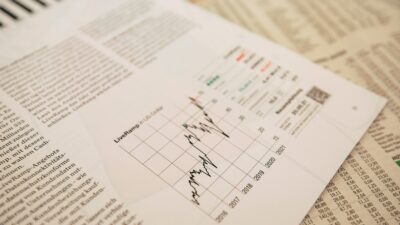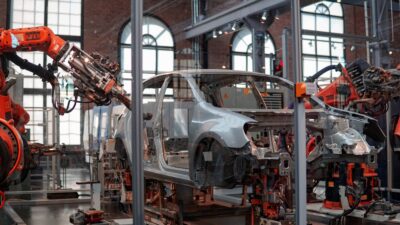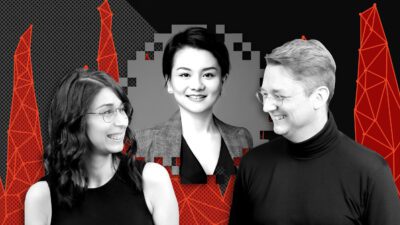Sandra Peter and Kai Riemer

Shakespearean AI and the capitalism crisis on The Future, This Week
This week: AI and Shakespeare, the capitalism crisis, and cows in VR. Sandra Peter (Sydney Business Insights) and Kai Riemer (Digital Disruption Research Group) meet once a week to put their own spin on news that is impacting the future of business in The Future, This Week.
The stories this week
01:31 Machine learning reveals Shakespeare’s collaborator
13:54 Capitalism is not in crisis, it’s everywhere
21:49 What’s up with cows in VR?
Other stories we bring up
Google Smart Compose is soon to come to Google Docs
The Age of Surveillance Capitalism by Shoshana Zuboff in the Guardian
Professor Shoshana Zuboff’s recent book, The Age of Surveillance Capitalism
Our Halloween discussion of animals that were accused of being international spies on TFTW
Aussie startup Livestock Labs’s implantable monitor for cows
You can subscribe to this podcast on iTunes, Spotify, Soundcloud, Stitcher, Libsyn, YouTube or wherever you get your podcasts. You can follow us online on Flipboard, Twitter, or sbi.sydney.edu.au.
Our theme music was composed and played by Linsey Pollak.
Send us your news ideas to sbi@sydney.edu.au.
Dr Sandra Peter is the Director of Sydney Executive Plus and Associate Professor at the University of Sydney Business School. Her research and practice focuses on engaging with the future in productive ways, and the impact of emerging technologies on business and society.
Kai Riemer is Professor of Information Technology and Organisation, and Director of Sydney Executive Plus at the University of Sydney Business School. Kai's research interest is in Disruptive Technologies, Enterprise Social Media, Virtual Work, Collaborative Technologies and the Philosophy of Technology.
Share
We believe in open and honest access to knowledge.
We use a Creative Commons Attribution NoDerivatives licence for our articles and podcasts, so you can republish them for free, online or in print.
Transcript
This transcript is the product of an artificial intelligence - human collaboration. Any mistakes are the human's fault. (Just saying. Accurately yours, AI)
Disclaimer We'd like to advise that the following program may contain real news, occasional philosophy and ideas that may offend some listeners.
Intro This is The Future, This Week on Sydney Business Insights. I'm Sandra Peter, and I'm Kai Riemer. Every week we get together and look at the news of the week. We discuss technology, the future of business, the weird and the wonderful, and things that change the world. Okay, let's start. Let's start!
Kai Today on the Future, This Week: AI and Shakespeare, the capitalism crisis and cows in VR.
Sandra I'm Sandra Peter. I'm the Director of Sydney Business Insights.
Kai I'm Kai Riemer, professor at the Business School and leader of the Digital Disruption Research Group.
Sandra So what are we going to do today? I think we should do Shakespeare today.
Kai Shakespeare?
Audio No sun shall ever usher forth mine honours, or gild the noble troops that waited upon my smiles. Go, get thee from me Cromwell; I am a poor fallen man.
Sandra AI is coming for Shakespeare.
Kai You've found a story.
Sandra I did.
Kai Okay, that sounds great. Also, I saw capitalism is in crisis, apparently. Could look at that.
Sandra Yeah.
Kai Yeah.
Sandra And then there's a few other strange things. I think you pointed me to some cows that are wearing VR headsets.
Kai Yeah. In Russia. But also I have intel which says that cows apparently are made to wear Fitbits as well. So let's look at that.
Sandra Definitely. Let's have a look at that. Okay. Should we get started?
Kai Well, yeah, let's do it.
Sandra So Kai, what happened in the future this week?
Kai Well, Shakespeare. Our first story comes from MIT Technology Review, and it has the long title "Machine learning has revealed exactly how much of a Shakespeare play was written by someone else". So the play in question concerns Shakespeare's Henry VIII, a play over which there has long been a suspicion that part of it was actually written by someone else.
Sandra Hang on. We have to do this properly. So this is a tale of drama and intrigue that starts in 1613.
Kai I think this is the furthest back we have gone on the podcast other than, you know, general references to, you know, the Big Bang or things like that. So 1616 is when Shakespeare died. So this is the period we're talking about.
Sandra So Henry VIII was performed around 1613 on the banks of the River Thames in London, where the King's Men performed Shakespeare's plays. At the time, there was another, quite famous in his time, playwright called John Fletcher, who actually finished some of Shakespeare's plays after he died. And while Fletcher has disappeared from history pretty much as a playwright, by the 1850's, as a literary analyst called James Spedding noticed remarkable similarities between Fletcher's work and some of Shakespeare's earlier work. Spedding then concluded in the 1800's that Fletcher and Shakespeare must have collaborated on Henry VIII during Shakespeare's life already.
Kai And if you look at the Wikipedia article, this is what it says there. But there has long been a debate about just how much Fletcher contributed to this piece and what the role of both of these authors was in creating Henry VIII.
Sandra So this matter has been unresolved for about 400 years. Until today.
Kai Enter Petr Plechac and the might of AI.
Sandra Yeah, I had you read his name. So Petr is at the Czech Academy of Sciences in Prague who said, 'well, why don't we try to use machine learning to identify who wrote Henry VIII after all,' and more or less tried to look at every single line of the play.
Kai And so just as a reminder, when we say AI machine learning, we mean sophisticated pattern recognition technology. So the kind of algorithm that you train on a body of data and that is then able to recognise the patterns that were picked up in that body of data. And we can obviously use this with images and we know how we can train algorithms to spot and recognise objects in pictures. We can also use this for speech recognition, but apparently it can also be used on something as subtle as the style of writing, not just the words, but the style by which text is composed.
Sandra And the short disclaimer here, just to say that, of course, an author's style can change throughout their lifetime and they can write in different styles. So when the analysis was done, they ensured that they were looking at writings from the same period as Henry VIII. But once the algorithm was trained, it was applied to Henry VIII. And the results were really quite interesting in that they pretty much supported Spedding's initial contention that this play was written by Shakespeare together with John Fletcher.
Kai But what is more, the algorithm revealed that not only were parts composed by either author, but that they must have collaborated much more closely on the piece because there's no clear distinctions of certain scenes written by one or the other. The change in authorship happened within scenes, at the beginning and end of scenes, and so it's more like a fluent back and forth between the authors. Almost as if they had an argument in their writing and the machine learning algorithm created a beautiful picture, which is in the article that we're going to put in the show notes.
Sandra And we must say here that overall it seems that Fletcher's work amounts to almost half of Henry VIII. So it's a fairly significant collaboration that the two playwrights have together. So the question now is, 'so what?'.
Kai So you could argue that this is interesting because we can train AI now on things like literary style. So you could just look at it purely from a research point of view and say, look, this is a nice technology demonstration. But if you think about it, this can have applications in different areas. But we should also ask the question, 'what good does it do to actually go back and demystify?' That display was now written only half by Shakespeare and half by someone else.
Sandra On the one hand, there's probably just the pure satisfaction that a dozen literary experts now could either, you know, high five or fist bump or...
Kai Hide in a dark corner, because there were those that disputed this theory.
Sandra So that's one thing. The other is to reconsider how now AI is helping us rethink or rewrite history. So it's not just changing how we look at things going forward, but how we look at things going back. So a lot of the work that we attributed to great lonely geniuses can now be reinterpreted through the lens of AI and we might find more collaborations of this sort in works that we consider to be of single authorship.
Kai So much like some professors in academia publish about 600 papers a year is hard to read that many, let alone write that many. There have been authors in the past that were very prolific, such as Shakespeare, where there has long been a suspicion that they would employ collaborators that would write with them or for them.
Sandra So there's another interesting point to consider here which is, will our use of AI on historical great literary figures or great writers or even great painters, great artists make us reconsider or rethink who they were or how significant they were in our history?
Kai And what good does that do, right? If we uncover the truth, so to speak, about authorship, because the context in which these plays were written is completely lost in the culture in which this happened and the influence that the master might have had on people writing with them as their pupils or students. So in order to just go and say this is not original, this is half written by someone else, we get a very removed new interpretation of history which might be interesting from a scholarly point of view. But the question is, does it actually change the cultural perception and significance?
Sandra Setting aside the past. This work has actually some really interesting implications for the future because on the one hand, you can use this techniques to extract a style and recognise things in written work, but you could also extract the style and apply it to specific work. And we've already seen this being used with images. We've seen filters that make your work look like the work of grandmasters.
Kai Yeah, you can then 'Gogh-ify' your Instagram selfie or 'Picass-ify' your holiday photograph. So this style of painting, of brush strokes, for example, and the use of colour being extracted and then.
Sandra Transferred.
Kai Yeah, exactly. And we know this from the work on digital humans. Where generative adversarial networks are used to create artificial people because the same patterns that are enshrined in these algorithms from training data to recognise faces can be used to generate faces. And so the idea here being then to actually use an algorithm that was trained on certain styles to change or employ a style to bring about a piece of writing that is written as if it was written by someone else.
Sandra And we know that this is much more difficult to do with work like Shakespeare's work so it's not that easy, actually.
Kai Bad news for anyone who thought they could just employ a Shakespeare filter to, you know their next email to their employer.
Sandra On the other hand, in slightly more simplistic ways, this is already used by companies like Google to extract your style of writing out of your emails, for instance.
Kai And that feature is called Smart, composed by Google. And it's part of Gmail where the algorithm will recommend the next few words to finish a sentence. And this technology is now being rolled out across the wider Google Suite, like to Google Docs, for example, as a beta under way to actually utilise this for other forms of writing. So for academic writers such as ourselves, it would mean that the algorithm would be trained on prior texts that someone has written to then help them be more efficient and actually producing new text in the same style.
Sandra But to push that a little bit further, it's easy to see how this can be monetised in the context of Google. By selling your own style or styles you respond well to selling that to advertisers so that the emails that you get there are the ads that you get would be written either in your own style or one that you seem to respond to quite well. The one of your close friends or partners or family members.
Kai And also, you know, people like Shakespeare could use this technology to 'Shakespeare-ify' Fletcher's work and make sure that it is not as easily detected that they were actually writing this.
Sandra Which brings us to a third 'so what?' with this article. Not so long ago, The New York Times published a number of exposes from an anonymous source in the White House. And there were a number of suspicions as to who this person might be. Using this sort of algorithm trained on the body of writings of particular people could be employed to try to guess or to uncover who has written anonymous work.
Kai And it then raises the same kind of ethical questions and questions of reliability that these technologies raise in other areas where the outcome can be a little bit hit and miss. Yes, we might say, OK, you know, with 80, 85 percent certainty, we've identified the person who wrote this, but we might be wrong with a 15 percent likelihood and we might actually suspect and accuse the wrong person.
Sandra So are you saying we shouldn't be using it to recognise if any of our students have used ghost writers to write their latest assessment? Well, you know, funny that you mentioned it. I mean, this we can make fun of, but I think this is actually where these technologies probably have the greatest immediate field of application. Plagiarism is a curious animal. All universities use plagiarism detection software, which is reasonably dumb because it picks up on texts that has been copied straight away. But if I steal an idea and rewrite it, it's not easily detected. And of course, if I just outsource my work to have it written by someone else, it's also not detectable because I'm not engaging in real plagiarism. I'd rather pass off someone else's work as my own. But here is where maybe the software can come in and see if a student's work over a semester is actually coherent. Yes, you could always use the same ghost writer, but also if something that has been written by the student themselves like in an exam, for example, exhibits the same style as other work that the student might pass off. And so you could imagine that this type of style extraction technology will make its way into plagiarism software in due course.
Sandra Probably not before it makes its way into commercial applications with some of the large tech companies.
Kai Well, if it's possible to do, it's already in use in advertising for sure. And, you know, creation of spam emails and the like.
Sandra So speaking of advertising, capitalism. Our second story for today.
Kai Comes from The Guardian. 'The crisis of capitalism is not the one Europeans think it is,' says Branko Milanovic.
Sandra Over the past year, we've actually seen quite a number of articles crop up and of course, a number of books on what has been termed the crisis of capitalism. And this is manifest in the effects capitalism has had on climate change in the rising inequality and in most Western economies and the earnings stagnation that we've seen over the past few years.
Kai In the so-called middle class. Because part of the inequality argument is that there's a small group of people who has actually benefited immensely, whereas the wider population hasn't actually gone forward very much. And there's been articles one such article in The Guardian is referred to in this article, which basically says that in the history of capitalism, there have been these different epochs where, you know, first we had rampant entrepreneurship with too little regulation. Then later on in the 70's, we had over-regulated economies, and we had Thatcherism to break open labour markets and make the economy more dynamic. In 2008, then we had the financial crisis. And since then, even radical measures like quantitative easing and negative interest rates haven't really helped Western economies kick back into gear. And so the argument has been made. Capitalism is in crisis.
Sandra So this article caught our attention because it was claiming that, in fact, there is no crisis at all, that capitalism is stronger than ever and it's working exactly the way it's meant to. That is to say, it's now more geographically widespread than ever in history. So if we think about the fact that we've got capitalism everywhere from Western Europe, the United States, all the way into China, various forms of capitalism where the particular idiosyncrasies. And not only is it more widespread than ever. The author makes the argument that there are now aspects of life that have been commodified, that have never been so before and that has actually given rise to new markets and has made them objects of transaction. Hence, capitalism is more widespread than ever.
Kai And the article refers to things like, you know, making money from private cars in Uber, renting out rooms as in Airbnb, but also dating platforms, Facebook and advertising. So basically all parts of our daily lives being monetised and turned into transactional markets.
Sandra So overall, capitalism has never been stronger. It's more geographically widespread and more spread into every single type of market than it has ever been before. Hence, the only reason the author claims we are even talking about a crisis is the plight of the middle class in Western economies and the rise of populism that are by-products of capitalism working extremely well.
Kai So I think the observation that capitalism is everywhere, that monetisation has crept into all parts of our lives, into practices that weren't traditionally transactional and academia, by the way, is one of them is a really valid one. But we've started discussing this. The author misses really fundamental mechanisms that are at work here, chiefly among this, the influence of digital.
Sandra So it is worthwhile pointing out and the author recognises as well that capitalism has seen these sort of expansions historically associated with the industrial revolution. So we see 18th and 19th century when things like food or shoes or clothing or other things that used to be produced in the household, people used to make it for themselves, began to be produced commercially and became part of the market. In a similar way, he observes that today, you know, delivering food or shopping or walking your dog or driving to work has become commoditised. Then the expansion of capitalism into these new markets has brought along something new. But he doesn't discuss the nature in which this has come about.
Kai So enter here, Shoshana Zuboff and surveillance capitalism. The way in which data about our collective behaviours is monetised to commodify our everyday behaviours on digital platforms and to sell access to these behaviours and manipulate these behaviours for financial gain.
Sandra So the observation that comes through in surveillance capitalism, and we'll put the book in the show notes. Is that...
Kai Going to be very long shownotes, a big book.
Sandra It's a very big book. But the very significant book that points to a new class of assets, which in Shoshana's words is termed 'behavioural surplus.' That is the all the information about what we do and how we think that can then be traded for profit in new markets. But these markets are based not on necessarily producing this information, but rather on predicting or producing our new needs. So what is crucially different in this case about surveillance capitalism is that there is a new form of exploitation that goes beyond kind of, strip mining our data and everything about us. But it goes directly towards shaping or directing or controlling our lives.
Kai And it is at this point that we've realised that in order to really do this topic justice and unpack it, we would have to bring in a whole lot of other angles, such as the influence of coding and Silicon Valley, the way in which convenience and the quest for reducing friction and efficiency drives digital monetisation of practices. Enter here, Karl Marx and his musings in his later writings about the frictionless machine.
Sandra Enter the political. Every time we've seen these crises of capitalism, whether they were in the 1850's or the 1900's or the 1930's or indeed the 1970's, with each crisis, we've seen a political response. Whether that was pressure from labour unions, whether there was governmental pressure that recalibrated capitalism, and we're not seeing the same sort of dynamics today. And that might be because the type of surveillance capitalism we discussed, the slightly more insidious, slightly more opaque or it might be because some of the consequences of this crisis go towards populism and towards fracturing the political realm as well.
Kai And there's even more angles. Talks about data abundance versus the innate characteristic of capitalism to thrive on scarcity and how this is playing out around platforms, as well as the observation which we had on the podcast previously around corporate inequality that most of the large organisations dominating digital capitalism are actually quite small in terms of employee numbers. And that has a profound effect on how we interpret this new form of capitalism.
Sandra And so we decided that this requires a special episode on capitalism.
Kai Digital capitalism. So there's a whole bunch of things that we need to unpack and discuss to do this topic justice.
Sandra And see some of you have sent us stories on this before. We encourage you over the next couple of weeks to send us any great insights, books, resources, papers, articles you've come across.
Kai And we shall sit down in January and actually record a special on digital capitalism. But...
Sandra But before we go, we have to talk about them.
Kai We have to talk about cows, Russian cows.
Sandra So this article comes from The Verge and it's titled "Someone is putting VR headsets on cows...
Kai And we want to know why."
Sandra And we do want to know why.
Kai So this is a 'mooooving' story involving animals, and since Sandra absolutely loves...
Sandra Cows.
Kai No. Stories with animals. If you haven't actually listened to the Halloween special, especially the Easter egg at the end, I urge you to. Sandra is still quite shaken.
Sandra Squirrels that got arrested in Iran for espionage. Yes.
Kai Yeah, yeah, no, I'm still shaken by your attempts to tell the story about Russian seals. Navy SEALs wearing...
Sandra With their little berets. Yes...
Kai Exactly.
Sandra Let's not try that one, again.
Kai So but this one here. The subtitle of this article, "Real virtual reality or just fake moos?" And we should, you know, keep this pattern going. So why is this happening?
Sandra As I'm looking at this picture of a cow with a VR headset strapped to it's head. You could, of course, say, why wouldn't you do this? But turns out that in this experiment being conducted in Russia, VR headsets could reduce anxiety and increase milk yield in cows.
Kai So it literally puts them into a better mooood.
Sandra I'm still not convinced this is not entirely a marketing ploy.
Kai Well, that is possible. The question is to what end? To excite track author, tech podcasts in the world? Well, it's working.
Sandra So in all seriousness, this could be part of a larger trend to improve animal well-being through technology.
Kai Bullshit. It's just, you know, milk yield. You showed them green pastures, right? Even though they're sitting somewhere in a garage and they'll just be giving more milk. They're virtually milking those cows for all their worth.
Sandra We could milk this story some more and talk about Google Grass and so on. But there are actually fair uses of technology for animal welfare.
Kai Well, let's see. I want to give a shout out to our colleague, Manoj Thomas, who joined the University of Sydney from Virginia. And he brought this story about farmers in Virginia putting Fitbit pits on their cows like not some specialized tech, but actual human Fitbits to monitor the activity levels of the cows and to feed them properly in order to improve milk yields according to how much a cow would mooove.
Sandra Going even further than that, there is a Sydney based startup called Livestock Labs, which actually developed an implantable device that goes into the cows jaw quite young and it stays with the cow for the rest of its life and gives you information on how far the cow went, but also how much it's chewed, whether it's in heat, whether it's stressed. So it can really help ensure animal welfare, especially on very large properties such as we have here in Australia.
Kai In other milk news, here's a paper title "More moood, more milk. Using VR to increase yield in milk production."
Sandra And now that's clearly all we have time for today.
Kai See you soon.
Sandra On The Future...
Kai Next week.
Sandra This Week?
Kai Yes. But next week.
Sandra On the Future, This Week. Next week. Thanks for listening.
Kai Thanks for listening.
Outro This was The Future, This Week made possible by the Sydney Business Insights team and members of the Digital Disruption Research Group. And every week right here with us, our Sound editor Megan Wedge, who makes us sound good and keeps us honest. Our theme music was composed and played live on a set of garden hoses by Linsey Pollak. You can subscribe to this podcast on iTunes, Stitcher, Spotify, YouTube, SoundCloud or wherever you got your podcasts. You can follow us online on Flipboard, Twitter or sbi.sydney.edu.au. If you have any news that you want us to discuss, please send them to sbi@sydney.edu.au.
Close transcript















